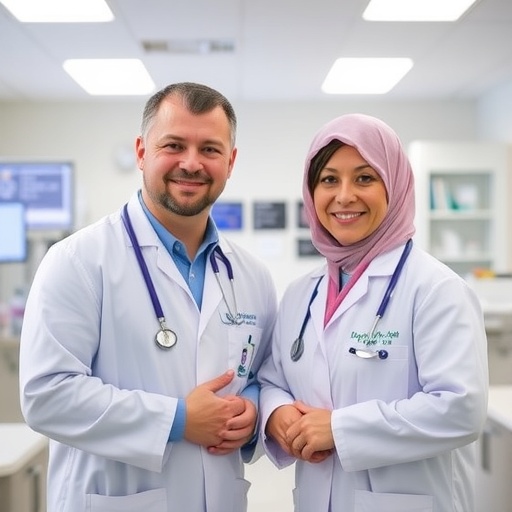In the landscape of rheumatic disease treatment, the advent of biosimilars marks a significant turning point, especially with the introduction of Infliximab biosimilar CT-P13. A recent national observational cohort study, known as ReFLECT, meticulously investigates the real-world effectiveness and safety of this biosimilar among patients battling various rheumatic conditions. The study ambitiously aims to provide clarity in a realm where data on biosimilars often emerges from controlled clinical trials rather than the nuanced arena of everyday patient care.
Researchers Marotte, Cantagrel, and Coury, along with their collaborators, designed the ReFLECT study to mirror the complexities of actual clinical practice. Conducted across multiple centers, this extensive study utilized a cohort of patients who have been administered CT-P13. One of the standout features of this research is its robust methodology that accounts for diverse patient demographics and clinical profiles, reflecting the variability found in real-world settings.
The backdrop of the ReFLECT study is significant as it emerges in response to the increasing use of biosimilars following patent expirations of reference biologics. Infliximab, an established treatment for autoimmune diseases, has proven effective yet costly, prompting healthcare systems to seek alternatives that can maintain therapeutic efficacy while reducing financial burden. CT-P13 represents an accessible option designed to mimic the original Infliximab, yet skepticism regarding the clinical equivalence of biosimilars persists among healthcare practitioners and patients alike.
.adsslot_u6pBqLST2I{ width:728px !important; height:90px !important; }
@media (max-width:1199px) { .adsslot_u6pBqLST2I{ width:468px !important; height:60px !important; } }
@media (max-width:767px) { .adsslot_u6pBqLST2I{ width:320px !important; height:50px !important; } }
ADVERTISEMENT
Data collected through the ReFLECT study addresses this skepticism by providing compelling evidence regarding CT-P13’s effectiveness. Early results demonstrate that patients receiving the biosimilar maintain similar clinical outcomes to those who have been treated with the original drug. This provides much-needed confidence for both clinicians prescribing these treatments and patients receiving them, many of whom are keen on minimizing out-of-pocket expenses while ensuring their health outcomes are uncompromised.
As one delves deeper into the outcomes of the ReFLECT study, it is crucial to highlight the patient population involved. The cohort consisted of individuals diagnosed with various rheumatic diseases, encompassing conditions such as rheumatoid arthritis, ankylosing spondylitis, and psoriatic arthritis. Findings indicate that CT-P13 was not only effective but also demonstrated a favorable safety profile, with adverse events reported at rates comparable to those observed with the original Infliximab.
Moreover, the study meticulously tracks long-term outcomes, looking at factors such as disease progression and the need for additional treatments. The observational nature of the study allows researchers to gather rich data on the ongoing management of rheumatic diseases, shedding light on how CT-P13 performs over time, and its role as an integral part of patients’ treatment regimens.
One of the defining aspects of this research lies in its contribution to the existing body of evidence around biosimilars. Historically, most evidence has emerged from randomized controlled trials, which, while crucial, often fail to capture the myriad of variables faced in everyday clinical practice. The wealth of observational data from ReFLECT presents a more holistic view of patient experiences, treatment adherence, and clinical outcomes in real-world settings.
As healthcare entities globally champion the use of biosimilars like CT-P13, the findings from the ReFLECT study may influence policy decisions, funding allocations, and ultimately, treatment strategies within rheumatology. Policymakers often cite data-driven results as a basis for supporting biosimilar use, making the outcomes of this research especially timely and critical.
The study underscores the need for continued vigilance in monitoring the long-term safety and efficacy of biosimilars. While CT-P13 has demonstrated reassuring outcomes in the short term, the commitment to post-marketing surveillance remains essential. It can uncover any rare adverse effects that may not have been identified during pre-approval clinical trials, ensuring comprehensive safety for patients.
Additionally, engaging patients in dialogues about biosimilars and their underlying mechanisms is paramount. Patient understanding of biosimilars, particularly in terms of efficacy and safety, significantly influences their acceptance and adherence to treatments. Awareness efforts led by healthcare professionals can enhance patient confidence in using CT-P13 and similar therapies.
In conclusion, the ReFLECT study serves not only as a beacon of hope for patients grappling with rheumatic diseases but also as a pivotal moment in the evolution of biosimilars within therapeutic regimens. By demonstrating that CT-P13 can rival its reference biologic in both effectiveness and safety, the study contributes a valuable chapter in the ongoing narrative of rheumatic disease management.
The compelling data and evidence generated from this extensive observational cohort study pave the way for a future in which biosimilars can be integrated seamlessly into patient care, potentially redefining the landscape of treatment strategies in rheumatology for years to come.
Subject of Research: Real-World Effectiveness and Safety of Infliximab Biosimilar CT-P13 for Rheumatic Diseases
Article Title: Real-World Effectiveness and Safety of Infliximab Biosimilar CT-P13 for Rheumatic Diseases: A National Observational Cohort Study (ReFLECT)
Article References:
Marotte, H., Cantagrel, A., Coury, F. et al. Real-World Effectiveness and Safety of Infliximab Biosimilar CT-P13 for Rheumatic Diseases: A National Observational Cohort Study (ReFLECT).
Adv Ther (2025). https://doi.org/10.1007/s12325-025-03304-6
Image Credits: AI Generated
DOI: 10.1007/s12325-025-03304-6
Keywords: rheumatic diseases, biosimilars, Infliximab, CT-P13, real-world effectiveness, safety, observational cohort study, patient outcomes.
Tags: autoimmune disease managementbiosimilar research methodologybiosimilars in clinical practicecost-effective treatment optionsCT-P13 Infliximab biosimilarhealthcare systems and biosimilarspatent expirations in biologicspatient demographics in biosimilar studiesreal-world effectiveness of biosimilarsReFLECT observational cohort studyrheumatic disease treatmentsafety and effectiveness of biosimilars





